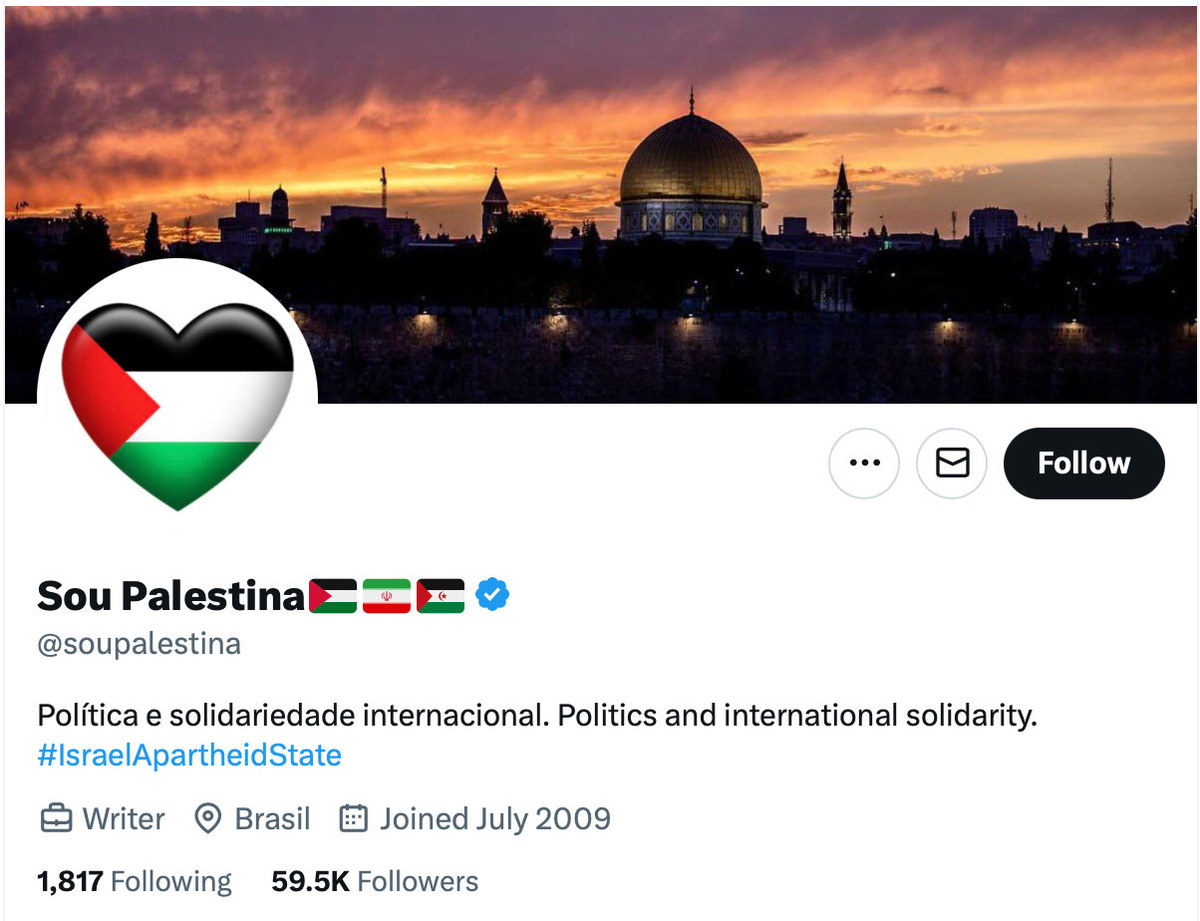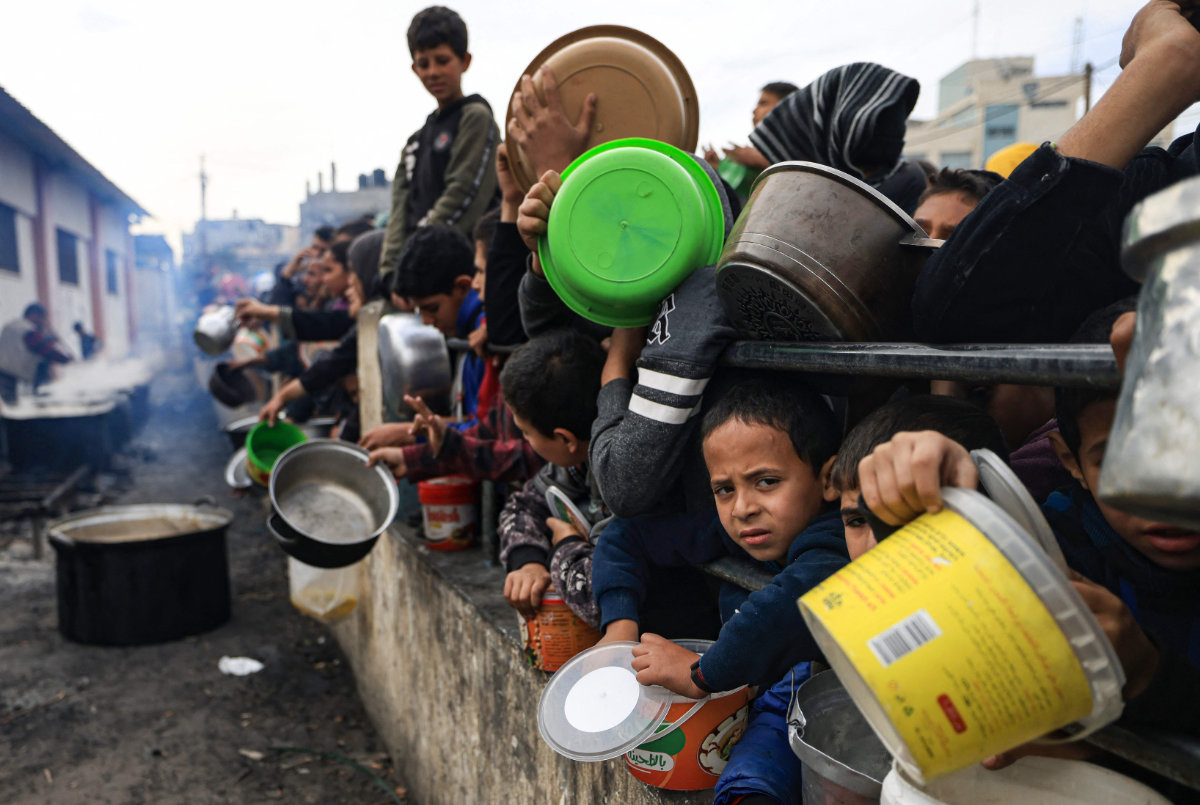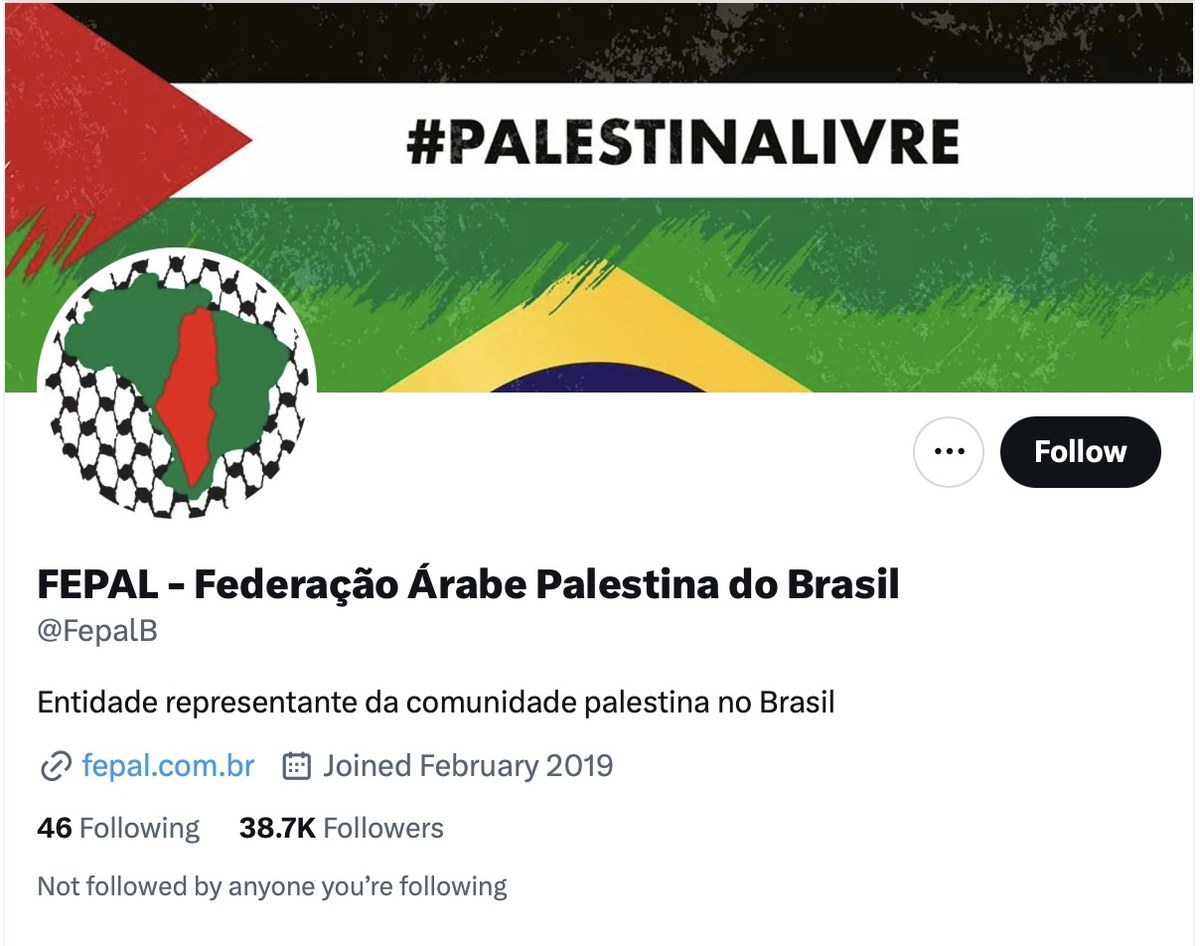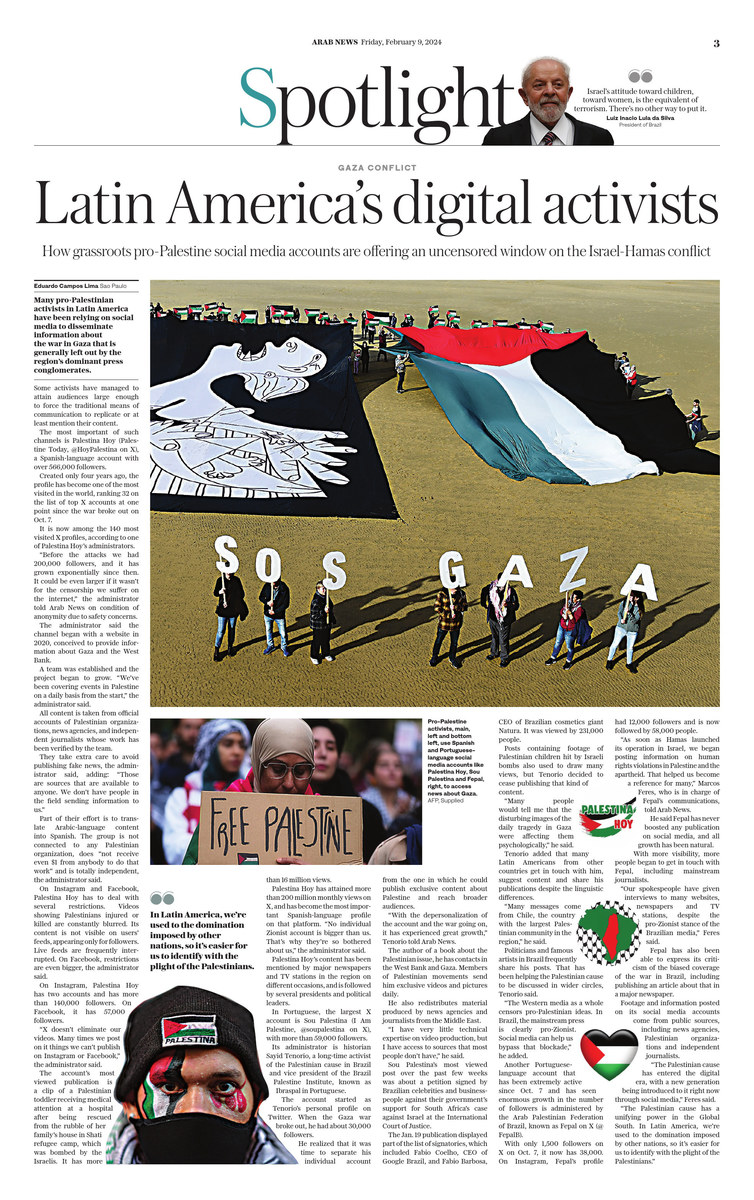How pro-Palestinian digital activists in Latin America are providing an uncensored view of Gaza
SAO PAULO: Many pro-Palestinian activists in Latin America rely on social media to disseminate information about the war in Gaza, usually left out of the region’s dominant media conglomerates.
Some activists have managed to reach a large enough audience to force traditional media to reproduce or at least mention their content.
The largest of these channels is Palestina Hoy (Palestine Today, @HoyPalestina on X), a Spanish-language account with more than 566,000 subscribers.

Created just four years ago, the profile has become one of the most visited in the world, at one point ranking 32nd on the list of top X accounts since the outbreak of war on October 7.
It is now one of the 140 most visited X profiles, according to one of Palestina Hoy’s administrators.
“Before the attacks, we had 200,000 subscribers, and since then this number has grown exponentially. This could be even greater without the censorship we face on the Internet,” the administrator told Arab News on condition of anonymity for security reasons.
The administrator said the channel started with a website in 2020, designed to provide information about Gaza and the West Bank.
A team was formed and the project began to gain momentum. “Since the beginning, we have been covering events in Palestine on a daily basis,” the administrator said.

Members of the Palestinian community in Venezuela take part in a demonstration against Israeli military operations in Gaza and in support of the Palestinian people at Bolivar Square in Caracas, October 12, 2023. (AFP)
All content is taken from official accounts of Palestinian organizations, news agencies and independent journalists whose work has been verified by the team.
They are especially careful to avoid publishing fake news, the administrator said, adding: “These are sources available to everyone. We don’t have people on the ground sending us information.
Part of their efforts involves translating Arabic language content into Spanish. The group is not linked to any Palestinian organization, does not “receive even a dollar from anyone to do this work” and is completely independent, the administrator said.
On Instagram and Facebook, Palestina Hoy has to deal with several restrictions. Videos showing injured or killed Palestinians are constantly blurry. Its content is not visible on users’ feeds, appearing only to subscribers. Live streams are frequently interrupted. On Facebook, the restrictions are even greater, the administrator said.

People take part in a demonstration in support of the Palestinians in Valencia, Carabobo state, Venezuela, October 13, 2023, amid Israeli airstrikes on Gaza in retaliation for a surprise attack by Hamas on October 7, 2023. ( AFP)
On Instagram, Palestina Hoy has two accounts and has over 140,000 followers. On Facebook, she has 57,000 subscribers.
“X does not remove our videos. Often we post things there that we can’t post on Instagram or Facebook,” the administrator said.
The account’s most viewed post is an excerpt of a young Palestinian man receiving medical treatment at a hospital after being rescued from the rubble of his family’s home in the Shati refugee camp, which was bombed by the Israelis. It has over 16 million views.
Palestina Hoy has reached over 200 million monthly views on X and has become the most important Spanish-language profile on this platform. “No individual Zionist account is more important than us. That’s why they care so much about us,” the administrator said.
Palestina Hoy’s content has been repeatedly mentioned by major newspapers and television channels in the region and is followed by several presidents and political leaders.
In Portuguese, the largest X account is Sou Palestina (I Am Palestine, @soupalestina on X), with over 59,000 followers.

Its administrator is historian Sayid Tenorio, a longtime activist for the Palestinian cause in Brazil and vice president of the Brazil-Palestine Institute, known as Ibraspal in Portuguese.
The account started as Tenorio’s profile on Twitter. When the war in Gaza broke out, he had around 30,000 followers.
He realized it was time to separate his individual account from one where he could post exclusive content about Palestine and reach a wider audience.
“With the depersonalization of the account and the war continuing, it has seen great growth,” Tenorio told Arab News.
Author of a book on the Palestinian question, he has contacts in the West Bank and Gaza. Members of the Palestinian movements send him exclusive videos and photos daily.

Protesters gather in support of Palestinians at Camoes Square in Lisbon on October 9, 2023 after the Palestinian militant group Hamas launched an attack on Israel. (AFP/File)
It also redistributes material produced by Middle Eastern news agencies and journalists.
“I have very little technical expertise when it comes to video production, but I have access to sources that most people don’t have,” he said.
Sou Palestina’s most viewed post in recent weeks was about a petition signed by Brazilian celebrities and businessmen against their government’s support for South Africa’s case against Israel at the International Court of Justice.
The January 19 publication presented part of the list of signatories, which included Fabio Coelho, CEO of Google Brazil, and Fabio Barbosa, CEO of Brazilian cosmetics giant Natura. It was seen by 231,000 people.
Posts containing images of Palestinian children hit by Israeli bombs also sparked many opinions, but Tenorio decided to stop posting this type of content.
“Many people would tell me that the disturbing images of the daily tragedy in Gaza were affecting them psychologically,” he said.

Palestinian children wait to collect food from a donation point in a refugee camp in Rafah, southern Gaza Strip. (AFP/File)
Tenorio added that many Latin Americans from other countries contact him, suggest content and share his posts despite language differences.
“Many messages come from Chile, the country with the largest Palestinian community in the region,” he said.
Famous politicians and artists from Brazil frequently share his posts. This helped the Palestinian cause be discussed in wider circles, Tenorio said.
“All Western media censors pro-Palestinian ideas. In Brazil, the mainstream press is clearly pro-Zionist. Social networks can help us get around this blockade,” he added.
Another Portuguese-language account, which has been extremely active since October 7 and has seen huge growth in followers, is administered by the Palestinian Arab Federation of Brazil, known as Fepal on X (@FepalB).
With only 1,500 subscribers on X on October 7, he now has 38,000. On Instagram, Fepal’s profile had 12,000 subscribers and is now followed by 58,000 people.
“As soon as Hamas launched its operations in Israel, we began publishing information about human rights violations in Palestine and during apartheid. This has helped us become a reference for many,” Fepal communications manager Marcos Feres told Arab News.
He said Fepal had never boosted any social media posts and any growth had been natural.

With more visibility, more people began to contact Fepal, including mainstream journalists.
“Our spokespeople have given interviews to numerous websites, newspapers and television channels, despite the pro-Zionist stance of Brazilian media,” Feres said.
Fepal was also able to express his criticism of the biased coverage of the war in Brazil, notably by publishing an article about it in a major newspaper.
Images and information posted on its social media accounts come from public sources, including news agencies, Palestinian organizations and independent journalists.
“The Palestinian cause has entered the digital age, and a new generation is now being introduced to it through social media,” Feres said.
“The Palestinian cause has a unifying power in the global South. In Latin America, we are used to domination by other nations, so it is easier for us to identify with the plight of the Palestinians.”



